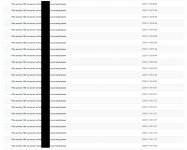Okay. Some progress I disabled those 3 blocklists mentioned in my previous message.
Now, after a reboot (and starting LFD manually) LFD is running.
However "ConfigServer Security & Firewall" is still awefully slow compared to a system running with CentOS 7.x.
Very strange. When I click it, it takes about a minute or more to load completely, though the server load is extremely low. Also memory usage is low.
The hardware for the test setup is fast, as I have used it also for testing DA with CentOS 7.x. I have no clue what is going on here. All other functions are fast, except for "ConfigServer Security & Firewall".
Will try a setup on different hardware just to make this is not the issue. However the blocklist issue was not active on DA servers with CentOS 7.x.
Regards
//edit 1
Even running "csf -v" from the CLI takes ages. While it takes less than second on a DA with CentOS 7.x install.
//edit 2
Okay after running "iptables -F" the command "csf -v" seems a bit quicker. Maybe some worthwhile side information. Our servers are created in OpenVZ 7 containers. And we have a sh*t list of wanna be hackers which we add on the hardware node as "route add -net XXXX.0/24 gw 127.0.0.1 lo".
This never was an issue before (same as with the use of blocklists on the server self), but now it appears to hog the performance of CSF for some reason. I find this very strange as we didn't experience this with DA with CentOS 7.x or even with CentOS 6.x. I must admin it's a big list of IP-ranges, but still and again; we didn't have these issues before. And also you should be able to use the CSF blocklists, right?
I will redo the complete server once again and experiment a bit more.
Now, after a reboot (and starting LFD manually) LFD is running.
However "ConfigServer Security & Firewall" is still awefully slow compared to a system running with CentOS 7.x.
Very strange. When I click it, it takes about a minute or more to load completely, though the server load is extremely low. Also memory usage is low.
The hardware for the test setup is fast, as I have used it also for testing DA with CentOS 7.x. I have no clue what is going on here. All other functions are fast, except for "ConfigServer Security & Firewall".
Will try a setup on different hardware just to make this is not the issue. However the blocklist issue was not active on DA servers with CentOS 7.x.
Regards
//edit 1
Even running "csf -v" from the CLI takes ages. While it takes less than second on a DA with CentOS 7.x install.
//edit 2
Okay after running "iptables -F" the command "csf -v" seems a bit quicker. Maybe some worthwhile side information. Our servers are created in OpenVZ 7 containers. And we have a sh*t list of wanna be hackers which we add on the hardware node as "route add -net XXXX.0/24 gw 127.0.0.1 lo".
This never was an issue before (same as with the use of blocklists on the server self), but now it appears to hog the performance of CSF for some reason. I find this very strange as we didn't experience this with DA with CentOS 7.x or even with CentOS 6.x. I must admin it's a big list of IP-ranges, but still and again; we didn't have these issues before. And also you should be able to use the CSF blocklists, right?
I will redo the complete server once again and experiment a bit more.
Last edited:

